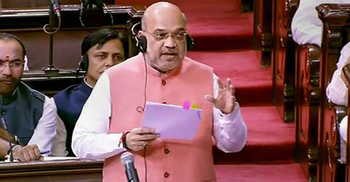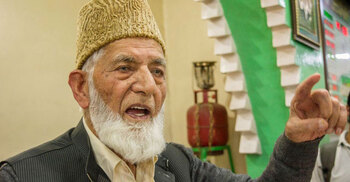India extends Kashmir lockdown after separatist icon’s death

Authorities have enforced a security lockdown and a near-total communications blackout for a second straight day in Indian-administered Kashmir after the death of Syed Ali Shah Geelani, a top resistance leader who became the emblem of the region’s defiance against New Delhi’s rule.
Geelani’s death at the age of 91 on Wednesday night and the ensuing crackdown on public movement and communications by the Indian authorities highlight the turmoil seething in the Himalayan region, claimed by both India and Pakistan who rule over parts of it.
Wearing flak jackets and riot gear, armed police and paramilitary personnel on Friday patrolled the streets in Srinagar, the region’s main city, and ordered residents to stay indoors.
Razor wire, steel barricades and perpendicularly parked armoured vehicles blocked some streets and roads in the city as officials anticipated anti-India protests after weekly congregational Friday prayers.
With multiple ailments and under house arrest for years, Geelani was quietly buried by the Indian authorities without any family members present after police snatched his body early on Thursday, his son, Naseem Geelani, told Al Jazeera.
Police in a statement denied Geelani’s forcible burial and called it “baseless rumours” by “some vested interests”.
Many mosques in the Muslim-majority region announced that they would say special prayers for Geelani, who had spent much of the past 50 years in jail or under house arrest.
Many mosques in the Muslim-majority region announced that they would say special prayers for Geelani, who had spent much of the past 50 years in jail or under house arrest.
Thousands of police and troops manned barricades and patrolled streets to keep people indoors following clashes between residents and government forces in Srinagar late on Thursday.
Police fired tear gas to disperse stone-throwing protesters but no injuries were reported, the AFP news agency reported.
Pakistan observed a day of mourning on Thursday and condemned Geelani’s non-public burial.
Geelani spearheaded Kashmir’s movement for the right to self-determination and was a staunch proponent of merging Indian-administered Kashmir with Pakistan.
For many in Indian-administered Kashmir and beyond, he was an enduring icon of defiance against India. Successive Indian governments often dubbed him a hardline politician.
For decades, Kashmir – India’s only Muslim-majority region – has been a flashpoint between India and Pakistan. Rebels have been fighting against Indian rule since 1989.
India describes the armed rebellion as Islamabad’s proxy war and state-sponsored terrorism, allegations rejected by Pakistan.
Most Kashmiris consider it a legitimate freedom struggle and support the rebel goal that the territory be united, either under Pakistani rule or as an independent country.
The region is one of the most heavily militarised in the world. Tens of thousands of civilians, rebels and government forces have been killed in the raging conflict.
Tensions flared in the region in 2019 after New Delhi stripped Kashmir’s semi-autonomy, scrapped its statehood and removed inherited protections on land and jobs.
Following the August 5, 2019 move, a similar internet shutdown and other restrictions were imposed for nearly a year in the region.
Authorities have since brought a slew of new laws, which critics and many Kashmiris fear could change the region’s demographics.
Source: Al Jazeera





